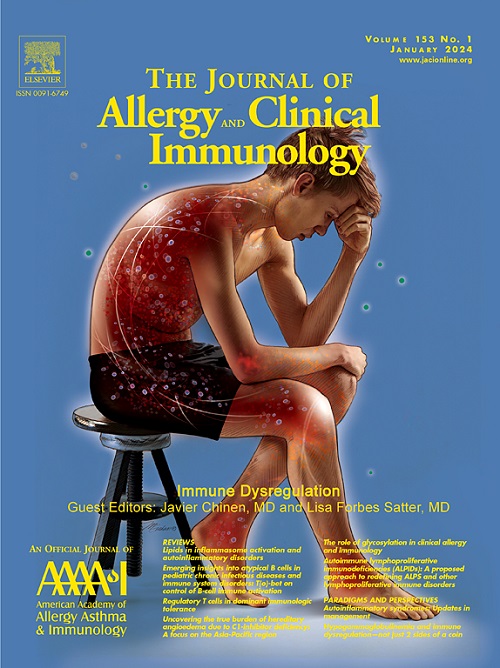Mepolizumab治疗淋巴变异型嗜酸性粒细胞增多综合征:一项多中心前瞻性研究
IF 11.4
1区 医学
Q1 ALLERGY
引用次数: 0
摘要
背景:嗜酸性粒细胞增多综合征(HES)以血液和组织嗜酸性粒细胞增多引起器官损伤和/或功能障碍为特征。Mepolizumab是一种抗il -5抗体,最近已被批准用于该适应症。在淋巴变异(L-)HES中,嗜酸性粒细胞的扩增是由产生il -5的克隆性CD3-CD4+ T细胞驱动的。目的:本研究旨在阐明mepolizumab治疗CD3-CD4+ L-HES患者的疗效,以及治疗对异常细胞及相关生物标志物的影响。方法:在两项评估mepolizumab在HES中的临床试验中进行了生物标志物亚研究,一项是32周的随机安慰剂对照试验(200622),随后是20周的开放标签延长试验(205203)。鉴定出CD3-CD4+和/或克隆T细胞,血清TARC/CCL17, sCD25和/或可检测IL-5升高的患者,并将其治疗反应与无这些异常的患者进行比较。结果:在200622-205203年纳入的108例患者中,103例同意本研究,其中包括17例CD3-CD4+ t细胞亚群患者。CD3-CD4+ T细胞或sCD25水平≥1500 pg/ml与mepolizumab降低嗜酸性粒细胞和节省皮质类固醇作用相关。没有一项生物标志物与临床发作的可能性增加有关。观察到mepolizumab诱导的血清IL-5升高,在CD3-CD4+ T细胞患者中显著升高。治疗不影响CD3-CD4+ T细胞计数。结论:Mepolizumab对CD3-CD4+ L-HES患者的疾病发作有良好的影响,尽管在目前批准的剂量下观察到减少嗜酸性粒细胞消耗和保留皮质激素的作用。需要进一步的研究在更大的患者队列中验证这些发现,并探索除耀斑外的临床活动是否在这种疾病变体中得到同样的控制。本文章由计算机程序翻译,如有差异,请以英文原文为准。

Mepolizumab in patients with lymphoid-variant hypereosinophilic syndrome: A multicenter prospective study
Background
Hypereosinophilic syndrome (HES) is characterized by blood and tissue hypereosinophilia causing organ damage and/or dysfunction. Mepolizumab, an anti–IL-5 antibody, has recently been approved in this indication. In lymphoid-variant HES, eosinophil expansion is driven by IL-5–producing clonal CD3−CD4+ T cells.
Objective
This study aimed to elucidate the efficacy of mepolizumab in patients with CD3−CD4+ lymphoid-variant HES, and the effect of treatment on aberrant cells and associated biomarkers.
Methods
A biomarker substudy was conducted during 2 clinical trials evaluating mepolizumab in HES, a 32-week randomized placebo-controlled trial (200622) followed by a 20-week open-label extension (205203). Patients with CD3−CD4+ and/or clonal T cells, elevated serum TARC/CCL17, soluble (s)CD25, and/or detectable IL-5 were identified, and their treatment responses were compared to those without these anomalies.
Results
Of the 108 patients enrolled onto 200622 and 205203, 103 consented to the study, including 17 with a CD3−CD4+ T-cell subset. Presence of CD3−CD4+ T cells or serum sCD25 levels ≥1500 pg/mL was associated with reduced eosinophil-lowering and corticosteroid-sparing effects of mepolizumab. None of the biomarkers was associated with an increased likelihood of experiencing clinical flares. A mepolizumab-induced increase in serum IL-5 was observed that was significantly higher in patients with CD3−CD4+ T cells. Treatment did not affect CD3−CD4+ T-cell counts.
Conclusion
Mepolizumab has a favorable effect on disease flares in patients with CD3−CD4+ lymphoid-variant HES, although reduced eosinophil-depleting and corticosteroid-sparing effects are observed at the currently approved dose. Further studies are needed to validate these findings on larger patient cohorts, and to explore whether clinical activity other than flares is equally controlled in this disease variant.
求助全文
通过发布文献求助,成功后即可免费获取论文全文。
去求助
来源期刊
CiteScore
25.90
自引率
7.70%
发文量
1302
审稿时长
38 days
期刊介绍:
The Journal of Allergy and Clinical Immunology is a prestigious publication that features groundbreaking research in the fields of Allergy, Asthma, and Immunology. This influential journal publishes high-impact research papers that explore various topics, including asthma, food allergy, allergic rhinitis, atopic dermatitis, primary immune deficiencies, occupational and environmental allergy, and other allergic and immunologic diseases. The articles not only report on clinical trials and mechanistic studies but also provide insights into novel therapies, underlying mechanisms, and important discoveries that contribute to our understanding of these diseases. By sharing this valuable information, the journal aims to enhance the diagnosis and management of patients in the future.

 求助内容:
求助内容: 应助结果提醒方式:
应助结果提醒方式:


